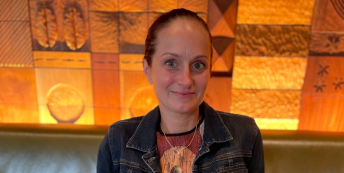“I spent a lot of time waiting for the right moment.”

What work were you doing previously?
I was working as a hydrogeologist at a civil engineering consultancy.
What are you doing now?
I'm now a software developer at an investment bank.
Why did you change?
There were a number of reasons why I decided to change.
I wanted to move to a different city but given how niche my role was, finding a new opportunity in that field was pretty difficult.
I had started doing some coding as part of my job and quickly found out that it was something I really enjoyed doing.
I started to do some in my spare time and as I learned more, I started to think it would be awesome if I could do this all the time for work, and not just as a small part of my job.
Eventually I decided that if I wanted a change I just had to go for it!
When was the moment you decided to make the change?
I spent a lot of time waiting for the right moment, or looking for reasons not to make a change.
One weekend, after visiting a friend in another city, I came home and realised that 'the right moment' might never arrive. If I wanted to do something different with my life then why wait around?
I handed in my notice at work two days later.
Are you happy with the change?
I couldn't be happier with the change!
I enjoy my work so much more now, and feel that I am working in a field with many more opportunities to learn, and to travel if needed.
Working in tech, I am constantly learning new things. The industry moves so fast and there are always new breakthroughs or technologies emerging, which is really exciting!
The role I'm in now challenges me every day and lets me think of innovative solutions.
What do you miss and what don't you miss?
I worked with some wonderful people and had a great manager and they are missed!
Other than that, I don't miss my old role at all. The technical detail in hydrogeology wasn't as captivating as working in tech.
How did you go about making the shift?
After handing in my notice, the pressure was on to find a new job that I loved.
My spare time was split between firing out applications and CVs, and trying to do as much coding as possible. Coming from a non-technology degree and a civil engineering role, there were not many job opportunities in computer programming available to me.
I began to research coding bootcamps to give me a better foundational knowledge and help secure me a job in tech. One day I got a call from the people at _nology, telling me I got a place on their bootcamp which led directly into a role with my current employer.
What didn’t go well? What wrong turns did you take?
I don't think anything went particularly wrong during my journey to a new career.
The uncertainty was tough to deal with. I had frequent moments of doubt after I had handed my notice in up until I was offered a place on _nology's programme. There were times I would look up jobs in hydrogeology or environmental engineering out of fear of not being able to break into the tech industry.
How did you handle your finances to make your shift possible?
I was in a position where I had saved enough money from my previous job to cover my living expenses.
The savings I had supported me during the learning period of the coding bootcamp.
What was the most difficult thing about changing?
The hardest thing to do was, without a doubt, to take the first step.
Making the decision to leave my job and pursue a totally different career after getting an MSc in that field was extremely tough.
To pursue something which I did not have any qualifications in was scary.
Once that was done, everything else was easier in comparison.
What help did you get?
I had a lot of support from family and friends, who listened to me and talked me through difficult and stressful times.
The people at _nology taught me so much about coding and set me up to hit the ground running in my new role.
I'll be forever grateful for the opportunity they gave me.
What resources would you recommend to others?
There is far more information online than you think!
If you want to get into coding, there's so many resources available, from free courses on Youtube to paid ones on Udemy. These can give you an intro to coding, so that you can see whether you like it.
I recommend taking on a personal mini-project. Try building something (anything!) small. This will help in interviews as it shows you've explored your interest in coding.
Do some research on coding bootcamps that advertise jobs upon completion. There's many out there but find the one that's right for you. Don't be afraid to get in touch and ask them questions either.
Job descriptions online can often be loaded with buzzwords or just lists of tech stacks that the company may or may not use. It's always better to talk to someone about the job than to try to figure it out from an online description.
What have you learnt in the process?
I've learned that there's a difference between liking your job and loving your work.
While I enjoyed aspects of the job I was in, I can now say that I love the work I do.
I've learned that careers are not as linear as they seem in the first few years after university. Many people I've met and talked to about their careers have made exciting changes that they may not have expected in the years prior.
As it turns out, more people want to make a change than they let on!
What do you wish you'd done differently?
I wish I'd made the change sooner!
What would you advise others to do in the same situation?
If you're looking to get a job in the tech industry, start coding in your spare time.
It will be a huge benefit in interviews and in the workplace if you can show a portfolio of different projects you've worked on. They can be personal interest projects and are great talking points in interviews.
Most importantly, showing that you've done this in your spare time shows that it's a genuine interest for you!
Thanks to our friends at _nology for this story. To find out more about their software developer programme, visit nology.io.
What lessons could you take from James's story to use in your own career change? Let us know in the comments below.



